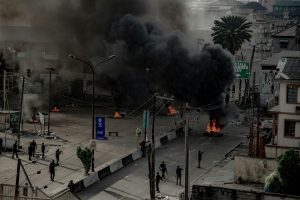Syrian diaspora across Europe reacts to the downfall of Bashar al-Assad
4 min readAfter over a decade of conflict, the Syrian diaspora across Europe is reacting with a mix of disbelief, joy, and relief at the reported downfall of Bashar al-Assad. For many in this community, this moment symbolizes the end of a long and painful chapter in Syria’s history, characterized by dictatorship, war, and oppression.
Amal Rifard, a Syrian refugee living in France, expressed her overwhelming emotions: “We can’t even believe it because it was a dream, really a dream,” she said. “We’ve been waiting for a very long time. Sixty years of humiliation, of dictatorship. We’re free, we can’t believe it. I’m afraid to sleep to get up and realise it was a dream.” For her and many others, the end of Assad’s rule represents the dawn of a new era for Syria and its people.
Similarly, a member of the Syrian diaspora in Austria voiced frustration at the way the conflict had been framed by the media. “It is a revolution. It’s not a civil war in Syria. The media in Austria say that there is a civil war in Syria. But it’s not a civil war. It is a revolution. And now it’s finally finished. Assad’s regime is finished. It is over,” they remarked. This perspective underscores the sentiment of those who view the 2011 uprising as a revolution born out of the desire for change, not just a civil war between factions.
A Revolution, Not Just a Civil War
The Syrian conflict began in 2011 as a peaceful protest movement inspired by the broader Arab Spring. However, it quickly escalated into one of the most devastating wars of the 21st century. While many regional leaders were ousted in the wake of the Arab Spring, Assad’s regime remained entrenched. He responded to protests with violent crackdowns, ordering the military to crush dissent. An estimated 3,500 protesters were killed in the early days of the uprising, and by 2012, the situation had spiraled into full-scale armed conflict.
The war saw various rebel groups fighting to overthrow Assad, but the Syrian government, backed by Russia and Iran, fought back with overwhelming force. The international community’s attempts to mediate were largely ineffective, and Syria descended into a prolonged civil war that devastated the nation.
The Human Cost of the Conflict
The toll of the Syrian conflict has been catastrophic. According to the UN Refugee Agency, more than 14 million Syrians have been forced to flee their homes since the conflict began, with 7.2 million remaining internally displaced within Syria. The scale of the refugee crisis has put immense pressure on neighboring countries, such as Turkey, Lebanon, and Jordan, but also on Europe, which has taken in a significant number of asylum seekers.
For those in the Syrian diaspora across Europe, the news of Assad’s reported downfall brings a sense of vindication and long-awaited hope for the future. Many of these refugees have lived in limbo for years, their lives upended by a brutal war. This moment, however, signals the potential for change, even as the path forward remains uncertain.
A Glimmer of Hope
The potential end of Assad’s regime could mark a turning point for Syria, although the country’s future is still uncertain. Years of conflict have left Syria in ruins, its infrastructure decimated and millions displaced. Yet for those in the Syrian diaspora, the collapse of Assad’s regime represents not just the end of a dark era but the beginning of something new.
“We’ve waited so long for this. It feels unreal,” said Rifard. “But we have hope again, and that is something we lost a long time ago.” The destruction and suffering caused by the war cannot be undone, but for many, hope has been rekindled for a better future for Syria.
The downfall of Assad’s regime marks the end of a brutal chapter, but the road ahead will be long and difficult. Rebuilding Syria will take years, if not decades, and the pursuit of justice for those who have suffered will be a monumental task. For the Syrian diaspora, the focus now shifts to supporting the rebuilding of the country and ensuring that the atrocities of the past are acknowledged and addressed.
The challenge of rebuilding Syria goes beyond infrastructure—it is about healing the deep scars left by years of war, restoring trust in governance, and creating a more inclusive society for all Syrians. For the millions of Syrians who fled the violence, the downfall of Assad gives them hope that their country can one day be restored to peace, stability, and prosperity.
Looking Forward
While the downfall of Bashar al-Assad is a moment of triumph for many, it also serves as a stark reminder of the monumental work required to rebuild Syria and achieve long-term peace. For those in the diaspora, the journey towards a free and democratic Syria is far from over, but the end of Assad’s reign represents the first step in reclaiming a future that has been out of reach for so long.





